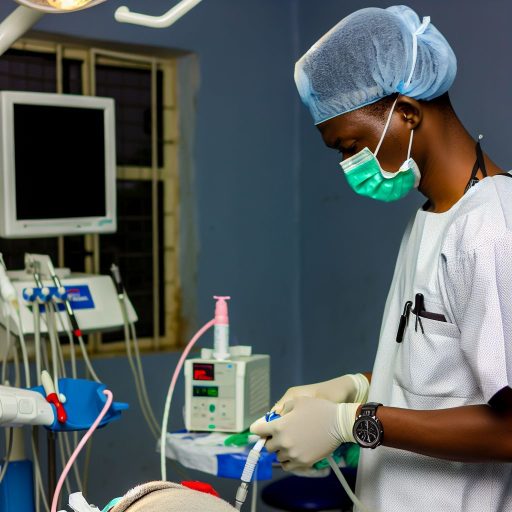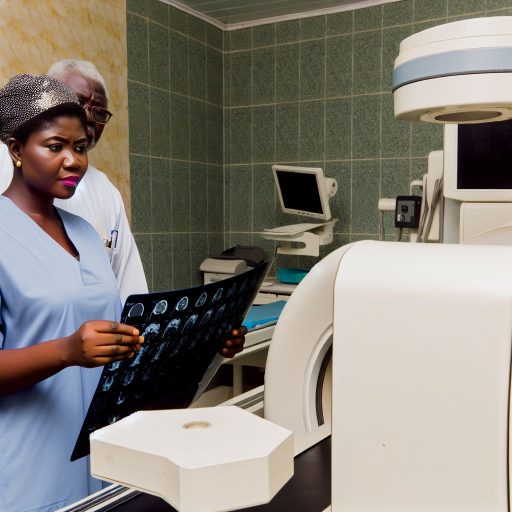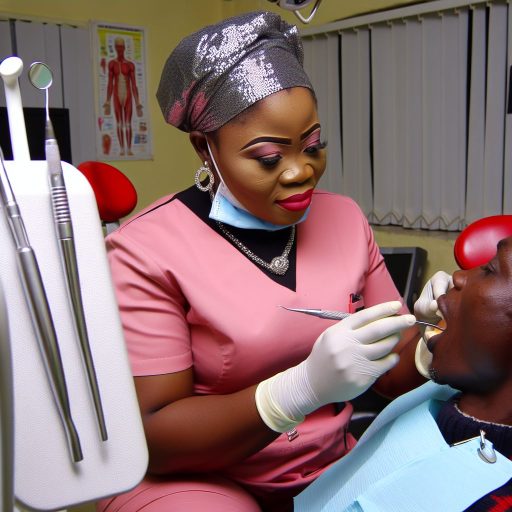Introduction
ENT surgery, also known as ear, nose, and throat surgery, is often performed to address issues with these areas of the body.
This type of surgery can range from simple procedures to complex operations, depending on the specific condition being treated.
After undergoing ENT surgery, it is essential for patients to make lifestyle changes to aid in their recovery and overall well-being.
These changes can help improve healing, prevent complications, and enhance the effectiveness of the surgical procedure.
Proper Nutrition
Following ENT surgery, patients should focus on maintaining a healthy diet rich in vitamins, minerals, and protein.
Proper nutrition can boost the immune system, promote tissue repair, and speed up the healing process.
Physical Activity
While it is crucial to rest and allow the body to recover after surgery, incorporating gentle physical activity into daily routines can help improve circulation.
This activity may reduce swelling and prevent complications such as blood clots.
Hydration
Staying hydrated is essential for post-operative recovery as it helps flush out toxins and maintains proper body functions.
Patients should aim to drink plenty of water throughout the day.
Follow-up Care
Regular follow-up appointments with the healthcare provider are critical to monitor the healing progress.
These appointments help address any concerns or complications and ensure the best possible outcome from the surgery.
Patients should follow all post-operative instructions provided by the medical team.
Stress Management
Reducing stress levels through relaxation techniques, mindfulness practices, or counseling can help improve overall well-being.
This approach supports the body’s healing process after ENT surgery.
It is essential to prioritize mental health during the recovery period.
Importance of following post-operative instructions
Adhering to the surgeon’s recommendations is crucial after ENT surgery.
- Proper care can promote faster recovery.
- Following instructions leads to better outcomes.
- Ignoring post-operative guidelines can result in complications.
The Role of Diet and Nutrition
Your diet plays a significant role in your recovery process.
- Eat foods rich in vitamins and minerals to aid in healing.
- Avoid spicy or acidic foods that can irritate the surgical site.
- Stay hydrated to help with healing and to prevent complications.
Physical Activity Recommendations
Exercise is essential for maintaining overall health after surgery.
- Follow your surgeon’s guidelines on when to resume physical activity.
- Start with gentle exercises like walking before progressing to more strenuous activities.
- Avoid strenuous activities that can strain the surgical site.
Medication Management
Proper medication management is crucial for a successful recovery.
- Take prescribed medications as directed by your surgeon.
- Do not skip doses or stop medications without consulting your doctor.
- Report any side effects or concerns about your medications to your healthcare provider.
Rest and Relaxation
Rest is essential for allowing your body to heal properly.
- Get plenty of rest and avoid strenuous activities during the recovery period.
- Follow your surgeon’s recommendations on when it is safe to return to work or daily activities.
- Engage in activities that promote relaxation and reduce stress levels.
Follow-Up Appointments
Attending follow-up appointments is crucial for monitoring your recovery progress.
- Keep all scheduled appointments with your surgeon or healthcare provider.
- Report any concerns or changes in your condition during follow-up visits.
- Discuss any lifestyle changes or modifications with your healthcare team.
Following post-operative instructions is vital for a successful recovery after ENT surgery.
By adhering to your surgeon’s recommendations regarding diet, physical activity, medication management, rest, and follow-up appointments, you can promote faster healing, reduce the risk of complications, and achieve better outcomes.
Your healthcare team is there to support you throughout your recovery journey, so do not hesitate to reach out if you have any questions or concerns.
Dietary Changes
After undergoing ENT surgery, it is crucial to pay special attention to your diet to aid in the healing process.
Here are some dietary changes that can help you recover more efficiently:
Foods that Can Aid in Healing
- Include plenty of fruits and vegetables in your diet, as they are rich in vitamins and antioxidants that promote healing.
- Protein-rich foods like lean meats, fish, eggs, and legumes can help rebuild tissues and strengthen your immune system.
- Healthy fats from sources like avocados, nuts, and seeds can reduce inflammation and support cellular repair.
- Incorporate whole grains like brown rice, quinoa, and oats into your meals for sustained energy and fiber.
- Herbs and spices such as turmeric, ginger, and garlic have anti-inflammatory properties that can speed up the healing process.
Importance of Staying Hydrated
It is essential to stay well-hydrated post-surgery to help flush out toxins, aid in digestion, and promote overall healing.
Drinking an adequate amount of water also helps prevent dehydration, which can hinder recovery by causing fatigue and affecting the body’s ability to heal.
Foods to Avoid
- Avoid processed foods high in sugar, salt, and unhealthy fats, as they can cause inflammation and slow down the healing process.
- Limit your intake of caffeine and alcohol, as they can dehydrate the body and interfere with medications prescribed after surgery.
- Spicy foods should be avoided, as they can irritate the throat and nasal passages, which may be sensitive post-ENT surgery.
- Acidic foods like citrus fruits and tomatoes should be consumed in moderation, as they can cause discomfort and irritation in the surgical area.
- Dairy products can thicken mucus and cause congestion, so it is best to avoid them or opt for alternatives like almond or coconut milk.
By making these dietary changes and following the recommendations of your healthcare provider, you can support your body’s healing process and ensure a successful recovery post-ENT surgery.
Uncover the Details: Blood Bank Services and Availability in Nigeria
Physical Activity Recommendations
After undergoing ENT surgery, it is important to prioritize physical activity in order to aid in recovery and improve overall health.
However, it is crucial to follow safe guidelines and gradually increase activity levels to prevent complications.
Safe Exercises Post-Surgery
- Walking: Walking is a low-impact exercise that can help improve circulation and prevent blood clots.
- Light stretching: Gentle stretching exercises can help improve flexibility and prevent stiffness.
- Yoga: Certain yoga poses can aid in relaxation, reduce stress levels, and improve overall well-being.
- Swimming: Swimming is a great way to stay active without putting too much strain on the body.
- Cycling: Stationary cycling can be a safe option for improving cardiovascular fitness post-surgery.
Gradually Increasing Physical Activity Levels
It is important to start slow and gradually increase the intensity and duration of your physical activity post-surgery.
Here are some tips to help you do so:
- Listen to your body: Pay attention to how your body feels and adjust your activity level accordingly.
- Set realistic goals: Start with small milestones and gradually increase them over time.
- Consult your healthcare provider: Before starting any exercise routine, make sure to consult your healthcare provider for personalized recommendations.
- Use proper form: Ensure you are using the correct form and technique to prevent injury and maximize the benefits of exercise.
- Stay hydrated: Drink plenty of water before, during, and after your workouts to stay hydrated and aid in recovery.
By following these guidelines and incorporating safe exercises into your routine, you can promote healing, improve your fitness levels, and enhance your overall quality of life post-ENT surgery.
You Might Also Like: Top ENT Hospitals and Clinics in Nigeria
Sleep Patterns and Habits
Maintaining a proper sleep schedule is crucial for the recovery process after ENT surgery.
Quality sleep plays a vital role in the body’s healing mechanism and promotes faster recovery.
It is recommended to get at least 7-9 hours of uninterrupted sleep each night post-operation.
Transform Your Career with Expert Guidance
Get personalized mentorship consulting that’s tailored to your unique path. Our expert advice is actionable and exclusive.
Get StartedHere are some tips to help improve your sleep patterns after undergoing ENT surgery:
- Create a Relaxing Bedtime Routine:
Establishing a bedtime routine can signal to your body that it’s time to wind down and prepare for sleep. - Avoid Stimulants Before Bed:
Try to avoid consuming caffeine, nicotine, or alcohol close to bedtime as they can disrupt your sleep. - Create a Comfortable Sleep Environment:
Make sure your bedroom is conducive to sleep by keeping it dark, quiet, and at a comfortable temperature. - Limit Screen Time Before Bed:
The blue light emitted from electronic devices can interfere with your body’s natural sleep-wake cycle. - Practice Relaxation Techniques:
Engage in activities such as deep breathing, meditation, or gentle stretching to help relax your body before bedtime. - Follow a Consistent Sleep Schedule:
Try to go to bed and wake up at the same time every day to regulate your body’s internal clock. - Limit Daytime Naps:
While it’s tempting to take long naps during the day, try to limit them to avoid disrupting your nighttime sleep. - Manage Pain and Discomfort:
If you’re experiencing pain or discomfort post-operation, speak to your healthcare provider about managing it effectively to improve your sleep.
By implementing these tips and making adjustments to your sleep habits, you can support your recovery and overall well-being following ENT surgery.
Gain More Insights: Success Stories: Nigerian Biomedical Technologists
Mental health support
Post-surgery emotional challenges are common.
It’s normal to feel anxious, frustrated, or overwhelmed.
Seeking mental health support can be beneficial.
Counseling or therapy can help in coping with emotions.
Support groups provide a sense of community and understanding.
Addressing emotional challenges
- Recognize your feelings and allow yourself to experience them.
- Communicate with your loved ones about your emotions.
- Engage in activities that bring you joy and relaxation.
- Practice mindfulness and meditation to calm your mind.
- Write in a journal to express your thoughts and feelings.
Sources of mental health support
- Consider seeking therapy from a licensed mental health professional.
- Online counseling platforms offer virtual sessions for convenience.
- Support hotlines provide immediate assistance in times of distress.
- Joining support groups can connect you with others facing similar struggles.
- Engage in self-help books or apps for mental wellness guidance.
Importance of mental health post-surgery
- Emotional well-being is crucial for overall recovery and healing.
- Addressing mental health issues can prevent long-term complications.
- Stress management is vital to reduce the risk of post-operative complications.
- Positive mental health fosters a more optimistic outlook on the recovery process.
- Seeking support ensures you’re not alone in your healing journey.
Learn More: Government and Private Support for Ophthalmology in Nigeria

Medication Management
Proper medication management post-ENT surgery is crucial for a successful recovery.
Importance of Taking Prescribed Medications as Directed
- Follow your doctor’s instructions carefully to ensure optimal healing.
- Medications help control pain, inflammation, and prevent infection.
- Skipping doses or altering dosages can hinder your recovery process.
- Consistency in medication regimen is key to managing post-operative symptoms.
Highlighting Potential Risks of Improper Medication Management
- Not taking medications as prescribed can lead to increased pain and discomfort.
- Improper dosages might result in complications or delayed healing.
- Missing doses can cause infections to develop or worsen existing conditions.
- Self-medication or stopping medications prematurely can have negative consequences.
Remember, your ENT surgeon prescribes specific medications for a reason, and adhering to their instructions is essential for your well-being.
After undergoing ENT surgery, it is crucial to follow up with your healthcare provider for scheduled appointments and check-ups.
These follow-up visits play a significant role in monitoring your healing progress and overall recovery.
Importance of Follow-up Appointments:
- Attending scheduled appointments ensures that your healthcare provider can assess your recovery and address any concerns or complications promptly.
- Post-operative check-ups are essential for monitoring the success of the surgery and ensuring that you are healing properly.
- These appointments also allow your healthcare provider to adjust your treatment plan if necessary and provide guidance on lifestyle changes post-operation.
Purpose of Post-operative Check-ups:
- During these check-ups, your healthcare provider will examine the surgical site to ensure it is healing correctly and free from infection.
- They may also perform tests or imaging studies to evaluate the effectiveness of the surgery and address any lingering symptoms.
- Post-operative appointments give you the opportunity to discuss any concerns or questions you may have about your recovery or ongoing treatment.
Attending follow-up appointments and check-ups is crucial for ensuring a successful recovery and optimizing the outcomes of your ENT surgery.
Make sure to prioritize these appointments and communicate openly with your healthcare provider throughout your post-operative care.
Lifestyle Changes for Successful Recovery
Lifestyle changes post-ENT surgery are vital.
Prioritizing recovery by making adjustments is essential.
Remember, your health is your wealth.
Make the necessary changes to ensure a smooth and successful recovery process.
Your commitment to these lifestyle changes will greatly impact your overall well-being.
These changes will aid in a faster healing process.
Stay dedicated and focused on your recovery journey.
By following the recommendations from your healthcare provider, you can greatly improve your outcomes post-ENT surgery.
Incorporate healthy habits into your daily routine.
Take charge of your health and make your well-being a top priority.
You have the power to make positive changes that will benefit you in the long run.
Embrace a healthier lifestyle post-surgery.
Reap the rewards of a stronger and healthier future.
Your commitment to these changes will improve your recovery.
These efforts will enhance your quality of life.
Remember, every effort you put into making these adjustments will pay off.
Stay motivated and positive throughout your recovery journey.
You have the strength and determination to overcome any challenges.
Your health is worth it.
Additional Resources
Pacemaker restrictions to lifestyle – Guys and St Thomas Specialist …




